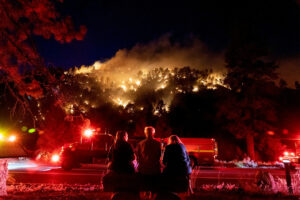BRUSSELS — Developing countries have proposed that a new U.N. fund unlocks at least $100 billion by 2030 to address irreversible damage caused by climate change, as states prepare to discuss who will benefit and who will pay in at the U.N. COP28 climate summit.
Countries will attempt to hammer out the details of the climate “loss and damage” fund at the summit taking place from Nov. 30 to Dec. 12 in Dubai. If launched, it would be the first U.N. fund dedicated to addressing irreparable damage from climate-fuelled drought, floods and rising sea levels.
While countries agreed to the fund last year, they postponed the most contentious decisions, including which countries will pay for it.
At a United Nations committee meeting last week, developing countries including those in Africa, Latin America, Asia-Pacific and small island states, proposed that the climate damage fund should program at least $100 billion by 2030.
The published proposal said $100 billion should be a “minimum” and provide a safety net when climate impacts overburden a country’s capacity to cope.
“Loss and damage are not just an environmental setback; it’s unraveling decades of development efforts,” said Madeleine Diouf Sarr, chair of the Least Developed Countries group of 46 nations, which supports the $100 billion proposal.
However, decisions at COP28 need unanimous backing from the nearly 200 countries that attend U.N. climate summits — and the proposal is at odds with the stance of some wealthy nations expected to contribute to the fund.
Diplomats said the U.N. meeting last week did not resolve the most contentious issues around the fund.
Last year’s U.N. deal ended years of deadlock over climate damages funding — which the United States and European Union had previously resisted, concerned it could lead to liabilities for countries whose historical emissions fueled climate change.
But countries are now at odds over which nations should pay into the fund, and which should receive support.
Michai Robertson, who represented the small island developing states’ group at last week’s U.N. meeting, said all developing nations should be eligible to receive support.
However, small island states — which are among the countries most vulnerable to climate impacts — caveat that this “open to all” approach must also ensure small, highly vulnerable communities are not sidelined by the demands of bigger nations.
The U.N. definition of developed countries that should contribute to climate finance — which dates back to the 1990s — does not include major economies like China and high wealth-per-capita nations like the United Arab Emirates, which is President of this year’s UN climate summit.
Wealthy nations want a more targeted fund. A draft of the European Union’s negotiating position for COP28, seen by Reuters, said the fund “should focus on developing countries that are particularly vulnerable”.
Countries are also split over who should pay.
A United States proposal suggested the fund should attract cash from governments, the private sector, philanthropies and new “innovative sources”. A section on which countries should pay was left blank. “There are currently differences of views,” the US proposal said.
Looming over the talks is wealthy nations’ failure to meet a 2009 pledge to provide $100 billion per year from 2020 in climate finance to poorer nations. That broken promise has fueled mistrust and resentment among poor nations facing calls to cut their CO2 emissions but struggling to raise money to do this. — Reuters

